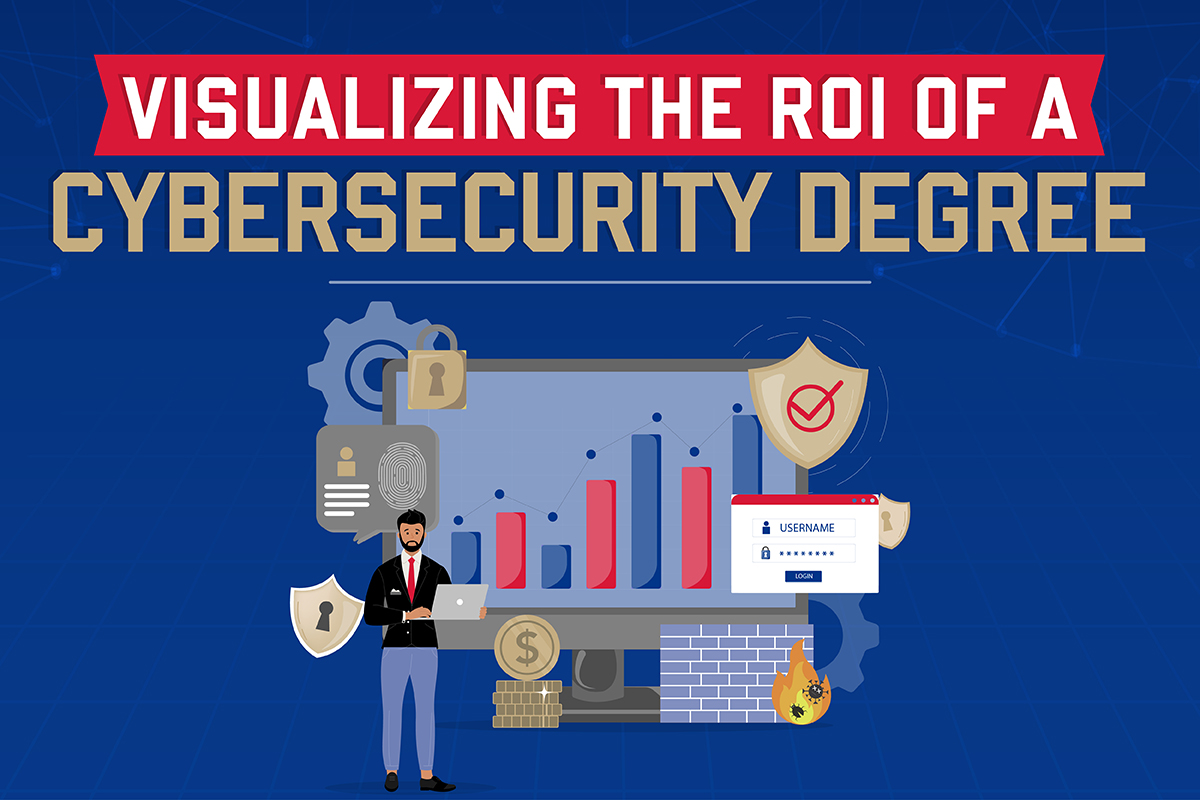Cryptocurrency Security Explained
Written by:
University of Tulsa
• Jul 23, 2024

Businesses are increasingly adopting cryptocurrency: a type of decentralized digital currency. Over 2,000 U.S. businesses accepted bitcoin as payment by late 2022, excluding bitcoin ATMs, according to Deloitte. As cryptocurrency becomes more important in finance, understanding potential threats and strategies to keep transactions secure is crucial.
The crypto industry faces wide-ranging threats, from cyber scams to data breaches. Cryptocurrency security helps ensure stability and growth. For individuals looking to protect digital investments from cyber threats, a career in this field may offer rewarding opportunities. With the right skills, coupled with an understanding of the fundamentals of what makes crypto secure, cryptocurrency security professionals can thrive in this dynamic field. For those looking to advance, a master’s degree in cybersecurity can equip them with the specialized knowledge and credentials to take on leadership roles in this field.
What Makes Cryptocurrency Secure?
As cryptocurrency gains traction in business and fintech, short for financial technology, understanding its security is essential. Key elements include blockchain technology, cryptographic techniques, and decentralization.
Blockchain Technology
Blockchain is a distributed ledger that serves as the backbone of cryptocurrency security. It allows users to make digital payments and records all transactions across a computer network. Blockchain’s decentralized structure prevents single points of failure, improving resistance to attacks and fraud. With each block in the chain linking to the previous block, altering transactions is computationally impractical. This ensures transaction integrity and system security.
Cryptographic Techniques
Cryptocurrency security also relies on advanced cryptographic techniques. As Investopedia explains, cryptography is the “crypto” in cryptocurrency, hiding information by converting a readable message (plaintext) into an unreadable message (ciphertext) through a mathematical algorithm, or “key.” Only someone with the correct key can access the data. Public-key cryptography uses two keys: a public key that’s shared freely and openly and a private key that’s kept secret. This ensures that only the private key owner can access assets, securing transactions.
For example, bitcoin uses Secure Hash Algorithm 256-bit (SHA-256) to encrypt the information from a block, ensuring data integrity by converting information into a hash, which is a unique 64-digit hexadecimal number in the blockchain. It uses a complex algorithm called secp256k1 for digital signatures, verifying the authenticity and integrity of digital messages, ensuring that they’re unaltered and from the expected sender.
Decentralization Benefits
Cryptocurrencies ensure security through decentralization, operating on a peer-to-peer network that distributes data across nodes. This prevents centralized control and manipulation of transaction data. Transactions are transparent yet pseudonymous, enhancing security and trust by minimizing the risk of corruption and ensuring fair transactions.
Common Security Threats in Cryptocurrency
A comprehensive discussion on cryptocurrency security involves identifying potential pitfalls within this digital landscape, especially common threats, such as phishing attacks, exchange hacks, and malware and ransomware.
Crypto-Phishing Attacks
Phishing targets cryptocurrency users through fake websites and emails, often impersonating exchanges or wallets to steal private information, such as keys or password recovery phrases. These scams compromise accounts and threaten overall ecosystem security by getting individuals to divulge confidential information or perform unsecure actions.
Exchange Hacks
Cryptocurrency exchanges, which hold substantial digital assets, are frequent targets for cybercriminals exploiting vulnerabilities, such as software flaws or human lapses. In 2022, over $3.8 billion in exchanges was stolen, according to Kaspersky, reflecting the increasing sophistication of attacks. The Mt. Gox hack, in which 7% of total bitcoins in circulation at the time were stolen from the once-largest bitcoin exchange, according to Investopedia, underscores the impact of hacks on users and the crypto market.
Malware and Ransomware
Crypto malware and ransomware pose significant threats by encrypting data or hijacking processing power for crypto mining. Ransomware demands cryptocurrency payments for data access, leveraging digital currency anonymity. These attacks can cause financial losses and disrupt operations. Robust cybersecurity measures and vigilant network monitoring are key to defending against these tactics.
Top Careers in Cryptocurrency Security
The cryptocurrency industry has created a wide range of professional opportunities within the realm of security. Highly sought-after roles include blockchain security engineer, cybersecurity specialist, and information security analyst. The salaries for these roles may vary based on factors such as experience and location, but in general, the median annual salary for roles requiring blockchain technology skills is $126,000, according to Payscale.
Blockchain Security Engineer
Blockchain security engineers ensure the safety of blockchain ecosystems by auditing code and securing decentralized applications, smart contracts, and protocols. They collaborate with developers, conduct security assessments, and support open-source projects. Proficiency in smart contract auditing; cryptography; and programming languages, such as Java and Python, is useful for these roles.
Cybersecurity Specialist
Cybersecurity specialists safeguard organizational networks by designing and testing security measures, such as firewalls. They monitor systems for vulnerabilities, perform penetration tests, and must have a bachelor’s degree in cybersecurity or computer science. Strong communication skills are vital for explaining security risks and protocols in plain language to nontechnical teams, as well as proficiency in programming languages and operating systems.
Information Security Analyst
Information security analysts protect organizational data by implementing security solutions, monitoring networks, and responding to breaches. Following security compliance analysis practices, they develop security protocols, stay current on cyber threats, and collaborate on security programs. Strong analytical skills are necessary for identifying vulnerabilities, and effective communication skills are crucial for reporting findings and coordinating security strategies.
Essential Skills for a Career in Crypto Security
Building a career in crypto security requires expertise in cryptographic protocols, blockchain technology, and programming. Individuals should also possess analytical thinking skills to analyze and solve complex problems.
Understanding of Cryptographic Protocols
Proficiency in cryptographic protocols is crucial in cryptocurrency security careers. Cryptographers secure data with symmetric and asymmetric cryptography, using standards such as Advanced Encryption Standard (AES), Rivest-Shamir-Adleman (RSA), and Elliptic Curve Cryptography (ECC). They design robust algorithms and systems to protect sensitive information.
Knowledge of Blockchain
Landing a role in crypto security requires a deep understanding of blockchain technology. Security architects use distributed ledgers, consensus mechanisms, and blockchain cryptography to design secure architectures and implement cybersecurity policies.
Programming Skills
Programming proficiency is vital in crypto security. Professionals need skills in C, C++, Python, and Java for cryptographic algorithms and blockchain development, including Solidity for smart contracts. Knowledge of cryptographic libraries is crucial for building secure systems.
Analytical Thinking
Cryptographers use analytical thinking to solve puzzles and develop encryption methods. Strong mathematics and computer science skills aid in algorithm development and threat anticipation. Analytical skills help ensure the effectiveness of cryptographic solutions against potential threats.
Take the Next Step in Your Cryptocurrency Security Career Journey
As the digital financial landscape evolves, skilled professionals are crucial for securing cryptographic assets, offering career opportunities and supporting digital currency stability. Those aspiring to impact the crypto world and ensure a safer digital future can pursue the online Master of Science (M.S.) in Cyber Security from The University of Tulsa. The program requires no prior information technology (IT) experience and teaches students about sociotechnical system security, defensive technologies, network security, cryptography, Internet of Things (IoT) security, and more.
Explore how TU’s online M.S. in Cyber Security can prepare you to lead in safeguarding digital frontiers.
Recommended Readings
Cybersecurity Coding and Programming Languages
Cybersecurity Internships and Resources
Cybersecurity Architect Job Description
Sources:
Arkose Labs, Guide to Cryptocurrency Security
Check Point, What Is Crypto Ransomware?
ChronoTech, The Top 10 Skills Needed for Crypto Jobs
City National Bank, “What to Know About Cryptocurrency and Cybersecurity Risks”
CoinCover, What a Great Time to Work in Crypto Security
Cointelegraph, How to Start a Career in Crypto? A Beginner’s Guide for 2022
CrowdStrike, “What Is Crypto-Malware?”
Deloitte, The Use of Cryptocurrency In Business
Investopedia, “Explaining the Crypto in Cryptocurrency”
Investopedia, “The Largest Cryptocurrency Hacks So Far”
Investopedia, What Is Bitcoin Mining? How to Get Started
Kaspersky, The Biggest Crypto Exchange Hacks: How to Make Sure You Protect Your Crypto Against Hacks


